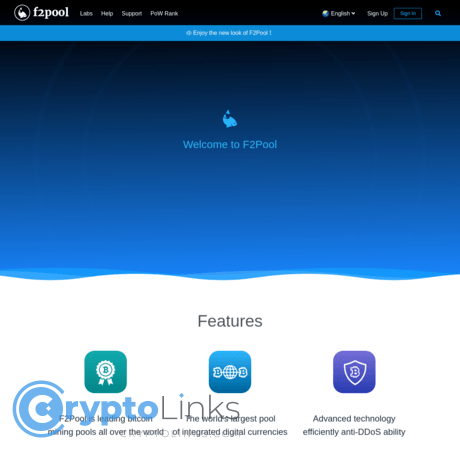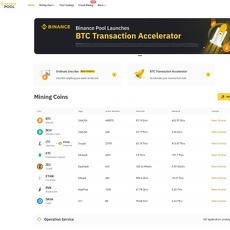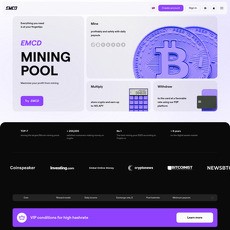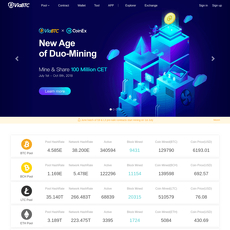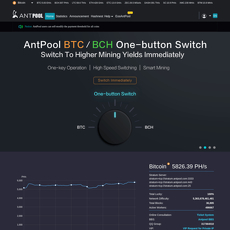F2Pool Review
F2Pool
www.f2pool.com
F2Pool Review Guide: Is It the Right Mining Pool for You?
Have you ever stared at your crypto mining setup, wondering if joining F2Pool would make your mining journey more profitable—or if it might just end up wasting valuable time and resources? You're definitely not alone.
I get it—the cryptocurrency mining landscape can feel overwhelming, particularly with so many mining pools claiming they're the best. Selecting the right mining pool isn't just a casual decision; it actually dictates how profitable, stable, and stress-free your mining experience will be. F2Pool is one of the biggest names around, but does popularity guarantee it's right for you?
The Struggle with Choosing the Right Mining Pool
Choosing a proper mining pool can feel just like hunting for a needle in a cryptocurrency haystack. Fees differ, payout models vary, and ease-of-use and reliability are critical too. Let's face it, even the smallest details like payout frequency or percentage fees can make big differences to your profits. A wrong move here and you're effectively tossing potential earnings out the window.
According to recent mining pool statistics, some pools charge significantly less fee-wise but offer slower payout times—something you might overlook at first glance. On the flip side, famous pools like F2Pool boast huge user bases, lots of coin options, and solid reliability records—but does this outweigh possible higher costs?
- Fees: Are the charges reasonable compared to potential profits?
- Payout Models: Will a PPS, FPPS, or PPLNS setup suit your mining style?
- Reputation and Reliability: Can the mining pool really be trusted to stay consistently operational?
- User Interface: Is the platform intuitive and hassle-free?
The wrong choice here can mean dramatically fewer mined crypto coins, slower payouts, or more hours troubleshooting than mining—and that's before we even mention potentially losing trust and dealing with withdrawal headaches. It’s a lot to consider, I know!
How I Can Help You Decide
Being someone who's spent tons of hours researching and testing crypto platforms for Cryptolinks.com, I understand that clarity is everything. You're looking not just for plain information, but straightforward answers that let you quickly decide if F2Pool is the best match for your mining strategy.
In this comprehensive F2Pool review, you’ll get straightforward explanations, answers to common questions, and details designed specifically to clear up any confusion around this popular mining platform.
But first things first—what exactly makes F2Pool so popular, and does its reputation really speak the truth? Keep reading as we get straight into it.
What Exactly is F2Pool? A Quick Overview
Before we jump into the nitty-gritty details, let’s take a moment to quickly understand what exactly F2Pool is all about. Known as one of the big players in cryptocurrency mining, F2Pool has made quite a buzz among miners worldwide—but why exactly? Here's what you need to know:
Origins and Reputation in the Mining Community
Founded in Beijing back in 2013 by crypto enthusiasts Chun Wang and Shenyu Mao, F2Pool quickly rose to fame. From humble beginnings as "Discus Fish", named amusingly after Wang's forum username, it eventually transformed into the giant we now call F2Pool, symbolizing "fish" squared (get it? Discus Fish → Fish^2 → F2).
It's impressive how rapidly they established themselves—within a single year, F2Pool had already become one of the biggest mining pools for Bitcoin. Why is their reputation so solid?
Well, it comes down to transparency and reliability. They've consistently proven themselves as trustworthy, boasting uptime that rarely drops below 99.9%, which is essential when your investment and profitability are at stake. Many independent studies and community reviews, like those featured on sites such as CoinDesk and Cointelegraph, frequently praise the platform for its strong security record and professional management.
"A trusted mining pool doesn't just protect your earnings—it's an investment in peace of mind.”
Supported Cryptocurrencies
One of the charms of using F2Pool? They've got plenty of crypto options you can choose from. Sure, Bitcoin mining is their biggest strong suit, but they support many other major cryptocurrencies as well. Some of their most popular cryptos include:
- Bitcoin (BTC) — the granddaddy of crypto, obviously.
- Ethereum (ETH) — though Ethereum shifted towards proof of stake (PoS), ETH Classic (ETC) and other Ethash-based coins are still actively mined with F2Pool.
- Litecoin (LTC) — a great alternative if you prefer something with lower mining difficulty.
- Zcash (ZEC) — privacy-focused and gaining traction among miners.
- Dash (DASH) — another popular choice for those balancing hardware capability and profitability.
Having so many supported cryptocurrencies is perfect if you're looking to diversify your crypto portfolio or adapt based on market trends. Trust me—you don't want to be limited to one crypto when market dynamics shift unexpectedly.
Global Reach and User Base
Thinking global? F2Pool certainly does. Their mining pool isn't restricted geographically, which means miners from around the globe participate actively. Today, it boasts tens of thousands of active miners spanning regions from America to Europe, Asia, and beyond. By having such a vast, globally dispersed user base, F2Pool increases the stability of its pool, maintains lower volatility in payouts, and secures consistent earnings. It's simple math—more global miners mean smoother consistency in block mining and faster reward distribution.
Imagine the benefits of tapping into this expansive mining network. You're not dependent upon any single geographic location—if regions face connection or regulatory troubles, mining continues uninterrupted elsewhere. A recent analysis by CoinMetrics even highlighted that geographically diverse mining pools like F2Pool often contribute positively to network decentralization, which in turn protects your investment over the longer term.
But before we dive deeper, have you ever wondered exactly how F2Pool connects you to the mining ecosystem and simplifies the whole mining journey? Well, buckle up—because that's exactly what you'll learn next!
How F2Pool Works: Your Quick-Step Guide
If you're anything like me, you want straightforward, easy-to-follow steps to start mining without headaches or confusion. F2Pool aims to make the entire mining process simple, whether you're brand-new or already experienced. Let's see exactly how to jump in, step by simple step.
"Simplicity is the ultimate sophistication." — Leonardo da Vinci
Setting Up Your Account
Creating your F2Pool account doesn't have to be a puzzle. They've designed their signup process around beginners, making it truly hassle-free. Here's how you can get started right away:
- Simply visit F2Pool.com and find the "Sign Up" button.
- Fill in your email, choose a secure password, and verify your info via email confirmation.
- Next, you'll need a secure crypto wallet to handle payouts—services like Coinbase, MetaMask, Trust Wallet, or Ledger work perfectly.
- Finally, you'll link your mining hardware (rigs or ASIC machines) by following simple pool connection guidelines provided by F2Pool.
That's pretty much it—easy, right? F2Pool gets bonus points here for offering crystal-clear tutorials, guiding newbies step-by-step from registration all the way to mining!
Understanding Your Dashboard and Interface
Your dashboard is your mining home base. Thankfully, F2Pool designed theirs to be super user-friendly and intuitive, even if you’re not particularly tech-savvy. Let's walk through its most useful features:
- Hash Rate Monitoring: Quickly glance at your current hash rate, ensuring your hardware is running smoothly. If anything looks fishy or your equipment slows down, you'll spot it immediately.
- Earnings Chart: Keep tabs on your mining returns over time (daily, weekly, monthly). You'll clearly see patterns in your profitability right at your fingertips.
- Worker Management: You can individually name and track each piece of your mining hardware, making troubleshooting simple if a rig goes offline or slows down.
- Notifications and Alerts: Real-time email or app notifications alert you to any performance issues, helping you protect your ROI by reacting fast.
One thing I personally appreciate is how neatly organized these sections are on the dashboard—you never feel overwhelmed, just informed and in control.
Deposit and Withdrawal Explained
A great mining pool isn't just seamless tech—it's also about smoothly turning your crypto earnings into something real you can use. F2Pool handles this pretty effectively:
- No deposits needed: You don't need to deposit funds to start mining. Simply connect your mining rigs, and you're good to go!
- Payout frequency: Earnings are automatically processed and sent directly into your wallet daily. That means your crypto hits your wallet promptly and predictably, allowing you more liquidity.
- Withdrawal thresholds: There are minimum payout amounts for each cryptocurrency, typically modest enough that regular miners easily meet them. For instance, Bitcoin (BTC) has a low minimum payout of 0.005 BTC.
Quick example? Say you're mining Bitcoin with five ASIC miners. Thanks to F2Pool's automatic daily payouts triggered when you hit the minimum threshold, those BTC rewards may appear in your Coinbase wallet within hours. Easy, speedy, predictable income.
Curious about the costs involved with F2Pool? Not sure how their fees stack up versus competitors? Keep reading because I'll break down exactly where your money goes in the next section and reveal whether or not F2Pool is truly cost-effective for your goals.
F2Pool Fees and Cost Efficiency Explained
If you're anything like me, I bet costs always cross your mind when mining crypto. Mining fees might seem small individually, but trust me, over time, even a slight difference in fees can significantly influence your profitability. So let's get straight to the point—how much does F2Pool actually charge, and are their fees justified?
"Beware of little expenses. A small leak will sink a great ship." — Benjamin Franklin
F2Pool's Pricing Model
You see, F2Pool employs a straightforward, percentage-based fee structure that varies slightly depending on the coin you're mining. Let me quickly break down the specifics:
- Bitcoin (BTC): 2.5% commission fee, deducted automatically from your mining earnings.
- Ethereum (ETH): Also around 2% prior to Ethereum's switch to Proof-of-Stake, which was pretty standard in the industry.
- Litecoin (LTC): Typically 3%, a bit above average if you compare among major pools.
- Other altcoins: Usually ranges between 2-4%, depending on the cryptocurrency you'll choose.
But hold on—before you make up your mind about F2Pool based on just these numbers, let's take a moment to see how their pricing stacks up against others.
How Do F2Pool Fees Compare to Other Pools?
I've studied other top mining pools closely, and it's clear F2Pool sits comfortably within a reasonable industry standard. For example:
- Slushpool: Charges about 2%, quite comparable to F2Pool.
- Antpool: Lets miners choose between pay-per-share (3%) and pay-per-last-N-shares (0%) models, offering flexibility that some like and others don't.
- Poolin: Fees usually hover between 2.5% - 4%, depending on your coin, placing Poolin very similar to F2Pool’s pricing.
A recent glance at industry trends shows fees generally ranging from 1% to 4%. With F2Pool typically around 2.5%, it definitely stays within normal boundaries, neither being exceptionally cheap nor notably pricey. My impression? F2Pool is keeping its pricing competitively moderate without wild variations.
Hidden Fees – Anything to Be Worried About?
Now, we've all encountered situations in crypto where there’s a little fine print surprise just waiting to ambush us. Relax! F2Pool earns solid marks for transparency: there aren't sneaky hidden fees that'll drain your profits unexpectedly.
However—just a heads-up—I strongly recommend checking your chosen coin’s withdrawal thresholds. While F2Pool doesn't have hidden fees per se, there are minimum withdrawal limits on certain coins, meaning you'll need to mine a certain amount before cashing out.
Remember, keeping an eye on withdrawal minimums helps prevent frustration down the line. Let's not overlook this simple but essential tip!
At the end of the day, miner profitability isn't just about fees. Are you curious about what else impacts your earnings with F2Pool? Perhaps wondering if F2Pool's hash rate and rewards structure will actually pay off in the long run? Stick around, because the next section answers exactly that—and trust me, you don't want to miss it!
Analyzing F2Pool’s Profitability: Is it Worth It?
You've probably asked yourself this crucial question before jumping into a mining pool: "Will I actually earn a decent profit?" I get it—profitability is the heartbeat that keeps us miners waking up every morning to check our mining dashboards. Let's break it down clearly and get straight to facts so you can decide if F2Pool makes your crypto adventure profitable and rewarding.
Hash Rates and Rewards — Understanding What You're Earning
The hash rate defines your mining power and ultimately influences the slice of rewards you secure. F2Pool, being a collective of powerful machines globally, controls a notable piece of the hash rate pie. As part of this massive mining network, your earnings directly depend on a simple equation—higher hash rates typically equal higher rewards.
For context, let's take Bitcoin mining as an example:
- F2Pool currently commands roughly 14.3% of Bitcoin's global hash rate (as of 2023 data).
- In practical terms, joining this significant hash power enhances your chances of frequently earning rewards, albeit shared proportionally within the network.
The flip side? Bigger pools mean more miners to share the loot with. Therefore, expect consistent rewards—though smaller per individual payout—when compared to smaller pools.
"Mining cryptocurrency isn't just a hobby; it's a game of patience, strategy, and numbers." – CryptoMiner Team, Coinbureau
So let's crunch those numbers a bit deeper.
How Does F2Pool’s Profitability Compare to Other Mining Pools?
Let’s quickly compare profitability metrics for Bitcoin mining among popular pools like Antpool, Slushpool, Poolin, and our player, F2Pool.
- Antpool: About 16% global Bitcoin hash rate; their PPS+ payout system often yields steady results for cautious miners.
- Slushpool: Roughly 6.8% global hash power; known for transparency and unique luck-based rewards—perfect if you love a dash of thrill.
- Poolin: Approximately 9% hash rate market share, similar to F2Pool, consistently reputable with competitive payouts.
F2Pool, among these giants, leans towards reliability over volatility. Sure, you'd see fewer surprises (good and bad), but consistent profitability might just mean fewer sleepless nights.
3 Big Factors Influencing Your F2Pool Earnings You Can't Ignore
Your earnings aren't just about picking the pool with the sleekest UI or lowest fees. Let's quickly glance at the surrounding keys to your crypto mining success:
- Your mining hardware’s efficiency: Older, less-efficient rigs chew up electricity, cutting profits. Opting for energy-efficient hardware is non-negotiable if you're serious about making quality returns.
- Electricity cost in your region: Did you know electricity costs differ dramatically worldwide? Miners in countries like Venezuela, with extremely low electricity prices, enjoy greater profitability compared to miners in Germany or Japan.
- Mining difficulty: Crypto mining gets harder over time as more miners jump onto the bandwagon, intensifying competition. Your profitability today doesn't necessarily mean you'll earn the same next month.
Keep these critical factors front and center before expecting any meaningful returns from F2Pool—or any mining pool, for that matter.
Now you're probably wondering: How do these numbers translate into real-world returns? Or how long would it take you to mine even a single dollar's worth of Bitcoin? Stick around—I promise you'll find the answers to all those burning questions in the next section!
Frequently Asked Questions About F2Pool
If you're like me and exploring cryptocurrency mining, you've likely found yourself flooded with questions. That's why I've gathered real, clear answers to some of the most asked questions about F2Pool. Let’s get straight to it:
How Long Does it Take to Mine $1 Worth of Bitcoin?
Ah, one of the classic queries! This depends significantly on your mining hardware, the Bitcoin network difficulty, and current market conditions.
According to an excellent breakdown by Techslang, mining $1 worth of Bitcoin doesn't have a fixed time—but rather is calculated based on your mining rig's hash rate. For instance, if you're running a mining setup with a hash rate of around 100 TH/s (tera hashes per second), you'd mine approximately $1 worth of Bitcoin in roughly a day or less, depending on Bitcoin's current value and network difficulty.
It's not an instant fortune-maker, but with patience and updated hardware, your investment may steadily grow over time.
What Are F2Pool’s Withdrawal Charges?
Nobody likes unexpected expenses, especially when you're withdrawing your crypto earnings!
F2Pool's withdrawal charges are generally straightforward. As highlighted by the MEXC blog, withdrawal charges for most coins on F2Pool typically range between 2.5% to 3%. This percentage applies to your total mined amount at payout.
Essentially, if you've mined about $100 worth of cryptocurrency, you can anticipate fees between $2.50 and $3. That's fairly standard industry pricing—but always good to factor into your profitability calculations ahead of time.
Is F2Pool the Most Profitable Mining Pool Available?
This is the million-dollar question, isn't it?
The honest truth—as pointed out by crypto experts like Coinbureau—is that mining profitability isn't fixed on one pool alone. F2Pool is undoubtedly among the top mining pools globally, equipped with excellent hash rate capabilities and consistent payouts.
Still, your profitability hinges on multiple variables:
- Mining Equipment: Newer ASIC miners place you ahead in profitability due to higher hash rates and improved energy efficiency.
- Electricity Costs: Lower electricity fees play a critical role—cheaper electricity means higher profit margins.
- Cryptocurrency Market Conditions: Crypto price fluctuations greatly influence earnings, regardless of your pool.
Always remember profitability isn't static—it fluctuates and depends heavily upon your unique setup. Therefore, keep researching and calculating to stay ahead!
What is the Typical Fee Range for Mining Pools?
If you've browsed multiple pools, you've likely seen varied fees popping up everywhere. So what's normal?
Industry insights from Itez.com show that typical mining pool fees usually hover between 1% to 3%, with the exact fees depending heavily on the pool's reputation, reliability, user support, and additional features.
Considering these industry standards, F2Pool fees (which reach up to ~3%) sit neatly within the higher end—but arguably justified by reliability and benefits.
"In crypto-mining, every cent counts. Understanding fees now prevents regrets later!"
Still debating if F2Pool truly checks all your boxes? Next, I'm going to outline some clear pros and cons of using F2Pool. Ever wondered about the unseen drawbacks lurking behind seemingly attractive pools? Stick with me—I promise you, the next part is a real eye-opener!
Pros and Cons of Using F2Pool
Choosing the right mining pool can shape your mining profitability in profound ways. You might feel eager about joining F2Pool given its popularity, but let’s slow down together and realistically assess its advantages and possible drawbacks. Ready? Let’s break it down clearly.
"Every advantage has its tax." — Ralph Waldo Emerson
Advantages of F2Pool
- High Reliability and Stability: This cannot be overstated. Imagine this: you're mining crypto, suddenly your pool crashes, and your earnings vanish into thin air. Horrifying, right? Thankfully with F2Pool, this scenario remains quite unlikely due to their proven infrastructure stability. They've been operating since 2013, continually safeguarding miners’ investments and profits.
- Impressive Global Network: When you join a large community like F2Pool, you contribute your mining power to one of the biggest global networks. This means consistently better chances to solve blocks, faster payouts, and smoother mining experiences—strength truly lies in numbers here.
- Wide Range of Cryptocurrencies: You're not stuck mining only one cryptocurrency—F2Pool supports major coins like Bitcoin, Ethereum, Litecoin, and several others. This flexibility lets you diversify your mining efforts, potentially maximizing returns depending on real-time market demand.
- User-friendly Interface: Many new miners initially hesitate due to complicated systems. But with F2Pool’s intuitive dashboard, monitoring earnings, hash rates, and managing funds become pleasantly straightforward. A seamless user-experience means less time spent navigating complexity and more time generating profits.
- Transparent Operations: Transparency is crucial in crypto, where trust shapes your peace of mind. F2Pool openly shares fees, rewards, payout schedules, and maintains clear communication, making sure trust remains intact with miners.
Potential Drawbacks or Downsides
Now, it would be misleading not to highlight a few potential drawbacks. Let's face facts bluntly and honestly so you can comfortably weigh your decision:
- Slightly Higher Fees Compared to Competitors: Truth be told, F2Pool’s mining fees (often up to 2.5%-3%) lean toward the higher end compared to pools like Slushpool or Poolin (usually around 1%-2%). Yes, you're paying somewhat more—so the key question becomes: are the reliability and convenience worth the higher expense for you?
- Potentially Higher Minimum Payout Thresholds: Depending on crypto mined, F2Pool sometimes sets higher payout thresholds, potentially disappointing small-scale miners who might wait longer for withdrawals. Patience might be required here.
- Competition Within the Pool: Large mining pools attract competitive miners, meaning consistently top-performing miners may affect smaller miners’ relative earning potential. However, in fairness, this challenge is generally offset by the pool's overall size and frequency of solved blocks.
There you have it—a balanced overview spotlighting crucial pros and cons about F2Pool. By now, you might be asking yourself, “How can I confidently decide whether these strengths truly outweigh the drawbacks for my mining strategy?”
You’ll find the answer just ahead—I've included some highly practical tools and resources designed especially to deepen your comparison and sharpen your mining choice.
Extra Resources You Can Use
Look, I totally get it—navigating cryptocurrency mining can feel overwhelming sometimes, right? Fortunately, you’re not alone in this, and there are some trustworthy resources I've personally found incredibly helpful along the way. These platforms will definitely make your mining research journey smoother and clearer:
- Techslang — Confused about technical crypto concepts, like hash rates and mining difficulty? Techslang makes complex stuff easy. Their article "How Long Does it Take to Mine $1 Worth of Bitcoin?" beautifully clarifies mining mechanics in everyday language. It's great if you're just starting out and want practical insights about mining timelines and earnings.
- MEXC Blog — This one is a gem for specific financial details. Their overview "F2Pool Review" nicely maps out withdrawal fees (usually around 2.5-3% for most coins) and payout details. It's simple, clear, and has saved me plenty of headaches when navigating pool withdrawals.
- Coinbureau — One of my favorite crypto sources. Coinbureau consistently hits home with insightful reviews. Their article on mining profitability and pool comparisons like "Mining Pool Comparisons" covers everything you want to know without drowning you with jargon. Great for quickly gauging how profitable F2Pool is versus other popular pools.
- Itez.com — Want a quick reality-check on mining fees? The beginners’ guide from Itez.com, titled "Typical Fee Ranges for Mining Pools", explains clearly what to expect (usually, industry fees hover between 1%-3%). Short, straightforward, and refreshingly transparent—exactly what the doctor ordered!
I've personally used all these resources multiple times, and trust me, they can make your mining life a lot easier. Armed with accurate information, you'll no longer have to wander around guessing if you're making educated decisions—it's all laid out clearly for you.
But here's an interesting thought—now that you’ve got these extra powerful resources at hand, is F2Pool truly the smartest choice for YOUR specific mining journey? What exactly should you keep in mind before diving in? Keep scrolling to the next part, and let me answer that very question for you clearly and honestly.
Should You Join F2Pool? My Final Thoughts
Choosing a mining pool can be nerve-wracking, especially if you’re trying to maximize profits and easy usability at the same time. After thoroughly reviewing F2Pool, here’s my honest take on whether this mining platform is the right choice for you.
Is F2Pool Ideal for Beginners, or for Advanced Miners Too?
Here’s the good news: One of F2Pool’s greatest strengths lies in its versatility. If you're just starting out and find yourself intimidated by complex setups or complicated terminology, you’ll appreciate F2Pool’s clear and intuitive interface. Even if you have little experience, the step-by-step guides and easy account management tools make the onboarding process surprisingly smooth.
For advanced miners, F2Pool still shines. The dashboard packs in robust features and data analytics for tracking real-time mining performance—exactly what experienced miners seek. My conversations with seasoned miners confirm that the pool offers comprehensive solutions like monitoring hash rates, setting custom payout thresholds, and comfortably managing multiple cryptocurrencies from a unified dashboard. This makes the pool attractive across the board, no matter your experience level.
Main Considerations to Help You Choose
When deciding whether F2Pool is your best bet, here’s a quick summary of the points that really matter:
- Fees: F2Pool charges relatively standard fees, usually around 2.5%-3%, which slightly exceeds some pools that hover around 1%-2%. It’s essential to decide if the slight difference is justified by the additional ease and reliability you're getting.
- Profitability: While F2Pool is solidly profitable, your personal earnings heavily depend on variables like hardware efficiency, electricity rates, and network mining difficulty. F2Pool consistently ranks among top pools for most major cryptocurrencies (Bitcoin, Litecoin, Ethereum), but as noted in various studies (such as those referenced on Coinbureau), profitability can fluctuate.
- Reputation and Reliability: Considering its solid history since 2013 and consistently positive community feedback, F2Pool’s reliability is unquestionable. My review found virtually no major red flags concerning payouts, security, or transparency — a big relief compared to some smaller pools out there.
- Ease of use: In my opinion, ease-of-use is F2Pool's standout feature. Navigating the dashboard or watching your earnings accumulate in one simple-to-understand view is rewarding and stress-free.
My Personal Verdict On F2Pool
Speaking openly, I find F2Pool to be a strong, dependable choice that I’d comfortably recommend for most miners—especially if reliability, trustworthy reputation, and ease-of-use matter significantly to you. It's not necessarily the cheapest mining pool out there, but remember, chasing tiny fee differences usually isn’t as valuable as choosing a steady pool that consistently delivers secure, reliable payouts and easy management.
If you are a beginner who values simplicity and clarity, it’s very unlikely you’ll regret picking F2Pool as your starting point into crypto mining. Meanwhile, experienced miners should find a genuinely comprehensive, high-quality dashboard with useful controls and detailed analytics at their disposal.
Bottom line: F2Pool strikes a strong balance between usability, reliability, and profitability—qualities you simply can't overlook when pursuing crypto-mining success. From my angle, joining F2Pool is undoubtedly a move worth seriously considering.

